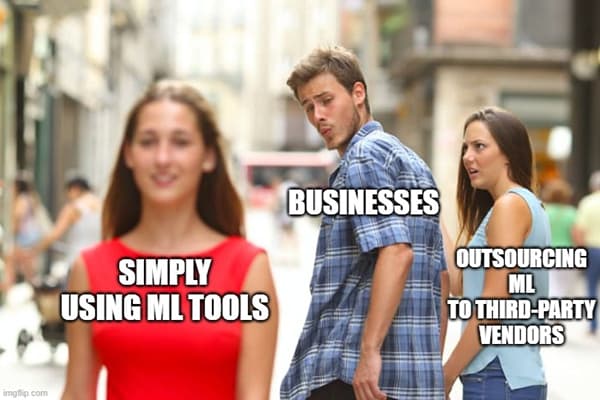Machine Learning Tools, also known as ML Tools, are the unsung heroes behind the magic of Machine Learning, enabling businesses to harness the power of data and create predictive models seamlessly. These tools play a pivotal role in integrating ML algorithms into enterprise solutions and platforms, simplifying the complex process of data analysis, pattern recognition, and insight generation.
In a world flooded with data, ML Tools empower businesses to make the most of their information without the hassle of transferring data between platforms. They offer a hands-on approach to Machine Learning, allowing companies to experiment with pre-trained models, develop custom models, and enhance data analytics techniques. By streamlining the process, these tools significantly accelerate analytics, prediction-making, and the creation of robust ML algorithms.
ML Tools have evolved to become indispensable for businesses, as they eliminate the need for in-depth expertise in Machine Learning, making the technology accessible to a broader audience. They bridge the gap between data and actionable insights, making it easier for organizations to leverage the potential of their data. These tools are the cornerstone of data-driven decision-making, propelling businesses into a new era of predictive intelligence and innovation.
Understanding Machine Learning Tools
Machine Learning Tools are applications that enable businesses to seamlessly integrate machine learning algorithms within their systems, allowing for the automated improvement of predictive accuracy and pattern recognition. These tools eliminate the need for explicit programming and enable real-world data to enhance pre-trained models over time. Once a model achieves a high level of accuracy, it can be deployed in production processes, automating various tasks. This evolution of ML Tools has made them highly impressive, similar to the transition from "hmm, okay" to remarkable automation solutions, shaping the landscape of data-driven decision-making and business innovation.
How Do Machine Learning Tools Work?
Machine Learning Tools operate based on the specific Machine Learning algorithm employed and the nature of the business requirements, data type, and preprocessing techniques. To better grasp their functioning, it's crucial to understand the four main categories of ML models, which also help categorize how ML Tools work:
1. Supervised Learning: In this approach, data scientists provide algorithms with labeled training datasets and specify the variables they want to find correlations between. Both input and output are predetermined, making it ideal for tasks where predicting outcomes or classifying data is essential.
2. Unsupervised Learning: ML Tools using unsupervised learning work with unlabeled data. These algorithms search through datasets for hidden patterns or relationships. While the input data is predefined, the correlations they uncover are not, making it useful for tasks like clustering or dimensionality reduction.
3. Semi-supervised Learning: This approach combines aspects of both supervised and unsupervised learning. Data scientists offer labeled training data, but the algorithm is free to explore and draw conclusions from the data. It strikes a balance between structured guidance and the discovery of new insights.
4. Reinforcement Learning: In this category, algorithms are trained in a multi-step process with predefined rules, and they make decisions independently. These algorithms receive feedback in the form of rewards or penalties to improve their performance over time. Reinforcement learning is often used in scenarios involving autonomous decision-making.
The choice of the ML model and the use of ML Tools depend on the desired outcome and the availability of labeled data. While labeled data offers clear advantages, ML Tools can be beneficial in various scenarios, allowing businesses to extract valuable insights, make informed decisions, and automate processes, irrespective of the data type and requirements.
Advantages Of Machine Learning Tools
Machine Learning Tools empower businesses with several advantages in various use cases. They excel in:
1. Handling Large Data Volumes: ML Tools efficiently manage vast volumes of data, enabling real-time processing and analysis.
2. Improved Accuracy: ML algorithms provide higher accuracy than human counterparts, leading to quicker decisions, precise outcomes, valuable insights, and increased profits.
3. Better Business Decision-making: ML Tools uncover hidden patterns and correlations in data, enhancing decision-making and deepening business data understanding.
4. Predictive Analytics: Machine learning aids in forecasting future events, allowing businesses to proactively plan and seize opportunities.
5. No Human Intervention: ML Tools enable autonomous processes, making predictions and decisions independently. This automation streamlines operations and enhances efficiency, offering a glimpse into the promising future of these tools in the business landscape.
What’s The Future Of Machine Learning Tools?
The future of Machine Learning Tools (ML Tools) holds immense promise and potential. A survey conducted in 2017 demonstrated that businesses were actively embracing ML strategies, and the market for ML Tools is poised for substantial growth. The global ML Tools market is expected to surge at a remarkable CAGR of 38.8%, reaching USD 209.91 billion by 2029 from USD 21.17 billion in 2022. These tools will form the bedrock of organizations' Machine Learning technology stack, enabling the creation and deployment of ML models across diverse sectors. Computer vision is anticipated to dominate this market, while ML Tools will advance generative AI techniques, aligning model outputs with business requirements. Machine Learning Tools are instrumental in making ML accessible and efficient for businesses, heralding a new era of data-driven decision-making and automation.
Enjoyed reading this content piece? There's a lot more where this came from! Head to TechDogs homepage and check out the myriad of Articles, Case Studies, Videos, News and Events & Webinars to Know Your World of Technology.






Top comments (0)